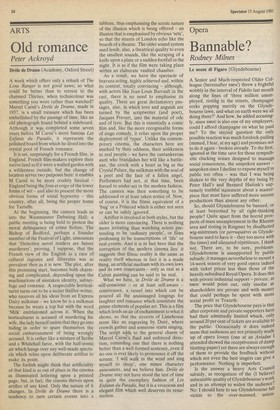ARTS
Old romance
Peter Ackroyd
Drole de Drame (Academy, Oxford Street) A week which offers only a rehash of The Lone Ranger is not good news; so what could be better than to retreat to the charmed Thirties, when technicolour was something you wore rather than watched? Marcel Carne's Drole de Drame, made in 1937, is a small treasure which has been embellished by the passage of time, like an old photograph found behind a sideboard. Although it was completed some seven years before M Carne's more famous Les Enfants du Paradis, it represents the polished board from which he dived into the crystal pool of French romance.
It is set, surprisingly for a French film, in England. French film-makers explore their native land as if it were a walled garden with a wilderness outside, but the change of location serves two purposes here: it enables M Came to be more crudely farcical — England being the fons et origo of the lower forms of wit — and also to present the more obvious forms of social hypocrisy — this country, after all, being the proper home for Tartuffe.
At the beginning, the camera leads us into the Westminster Debating Hall; a public meeting is being held to protest the moral delinquency of crime fiction. The Bishop of Bedford, perhaps a founder member of the Festival of Light, announces that 'Detective novel readers are future murderers'; proving, I suppose, that the French view of the English as a race of cultural ingrates and illiterates was as prevalent then as it is now. The plot, after this promising start, becomes both charming and complicated, depending upon the machinations of mistaken identity, subterfuge and romance. A respectable horticulturist turns out to be a secret thriller-writer, who receives all his ideas from an Express Dairy milkman — we know he is a milkman because he wears a top hat with the word 'Milk' emblazoned across it. When the horticulturist is accused of murdering his wife, the lady herself insists that they go into hiding in order to spare themselves the social embarrassment of being wrongly accused. It is rather like a mixture of Scribe and a Whitehall farce, with the half-ironic air which hangs over any well-made spectacle which relies upon deliberate artifice to make its point.
The foolish might think that artificiality of that kind is as out of place in the cinema as illuminated letlering upon a printed page; but, in fact, the cinema thrives upon artifice of any kind. Only the nature of it changes. In Drole de Drame there is a tendency to turn certain events into a tableau, thus emphasising the scenic nature of the illusion which is being offered — an illusion that is emphasised by obvious 'sets', so that the streets of London echo like the boards of a theatre. The older sound system used lends, also, a theatrical quality to even the smallest sounds, like the scraping of a knife upon a plate or a sudden footfall in the night. It is as if the film were taking place within an elaborate vaulted chamber.
As a result, we have the spectacle of bravura acting, highly achieved and, within its context, totally convincing — although, with actors like Jean-Louis Barrault in the cast, there is no need to emphasise its quality. There are great declamatory passages, also, in which love and anguish are turned by the scriptwriter (and poet), Jacques Prevert, into the material of ode and of lyric. But this is essentially a comic film and, like the more recognisable forms of stage comedy, it relies upon the proper deployment of 'types'. Unlike the contemporary cinema, the characters here are marked by their oddness, their unlikeness to real people — we have the cantankerous aunt who brandishes her will like a battleaxe the crook with a heart as big as the Crystal Palace, the milkman with the soul of a poet and the face of a fallen angel. Performers had not, at that time, been forced to under-act in the modern fashion. The camera was then something to be addressed or at least taken notice of. Now, of course, it is the filmic equivalent of a 'bug' or a Polaroid which is either not seen or can be safely ignored.
Artifice is involved in both styles, but the older is more convincing. There is nothing more irritating than watching actors pretending to be 'ordinary people', or films professing to be transcriptions of 'life' or real events. And it is in fact here that the corruption of the modern cinema lies: it suggests that filmic reality is the same as reality itself whereas in fact it is a made thing, an artificial medium with its own laws and its own constraints — only as real as a Cubist painting can be said to be real.
What we have, in DrOle de Drame is a self-conscious — or at least self-aware — contrivance, a vessel into which can be poured all the unassuaged longings for laughter and romance which constitute the prime elements of popular art. This is a film which lends an air of enchantment to what it shows, so that the streeets of Limehouse seem like an engraving by Dore, where crowds gather and someone starts singing. The script adds to the general charm of Marcel Carne's fluid and unforced direction, reminding one that there is nothing better than a well-formed sentence, even if no one is ever likely to pronounce it if the screen: 'I will walk in the wind and sing myself to sleep', one minor character announces, and we believe him. Drole de Drame may not have stood the test of time in quite the exemplary fashion of Les Enfants du Paradis, but it is a vivacious and elegant film which well deserves its resurrection.


































 Previous page
Previous page